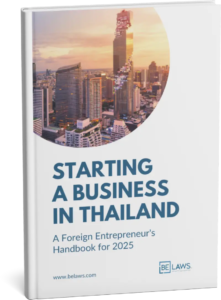Legal
Ultimate Guide to Opening a Hotel in Thailand: Steps, Requirements, and Tips
Opening a hotel in Thailand requires careful consideration of the legal requirements involved. Thailand has specific laws and regulations that foreign investors must comply with to operate a hotel business there. Therefore, before embarking on opening a hotel in Thailand, it is important to understand the legal requirements involved.
This guide will introduce opening a hotel as a business in Thailand.
Key points
- Foreign investors can engage in hotel businesses in Thailand through a minority shareholding in a Thai Limited Company or a 100% owned Thai Limited Company (LLC).
- If foreigners own more than 49 percent of the shares in a company, they must obtain a Foreign Business License (FBL) to operate a hotel business.
- Thailand’s Hotel Act of 2004 defines companies that offer paid lodging for less than 30 days as hotel services. This means that renting out a condominium unit also falls under the definition of hotel service.
- The BOI offers specific promotions for companies operating in the hotel industry in Thailand.
- Investors will also need to obtain several business licenses, including a hotel license, entertainment license (if they plan to have live music etc), alcohol license if alcohol is to be sold on the premises, fire safety certification, environmental license, and food and beverage license.
Can foreigners open a hotel in Thailand?
Yes, a foreigner can open a hotel in Thailand. There are three possible options to do so:
- Open a hotel with a Thai partner holding over 50% of the shares.
- 100% foreign-owned company that has applied for and obtained a Foreign Business Licence.
- Apply for and obtain a BOI promotion.
If foreigners own more than 49 percent of the shares in a company, they must obtain a Foreign Business License (FBL) to operate a hotel business.
However, being a minority shareholder in a Thai Limited company does have some advantages over a 100% foreign-owned company, such as not being restricted by the Foreign Business Act.
Foreigners can have control of a Thai Limited company while still adhering to the Foreign Business Act (FBA) ownership requirements. This is due to the Thai interpretation of the law being about ownership and not controlling a company. Under the FBA, Foreigners can have majority voting rights and control in a Thai limited company through preference shares and weighted voting rights.
It is important to note that using nominee shares in Thailand is expressly prohibited by the Foreign Business Act. A nominee shareholder (Thai National) has shares in a company but has no legal rights or ability to control or manage the company.
More information about the Foreign Business Act can be found in the next section.
It is also common practice for hotel groups to own the land and the building under a Thai majority-owned company. However, the hotel management is operated by another company through a hotel management contract.
A hotel management contract in Thailand is an agreement between a hotel owner and a hotel management company. Under this contract, the hotel management company is responsible for managing and operating the hotel on behalf of the owner. This includes managing the hotel’s day-to-day operations, such as hiring and training staff, marketing and sales, guest services, and maintenance.
The hotel management contract typically outlines the specific terms and conditions of the agreement, such as the length of the contract, the fees paid to the management company, the performance standards that the management company is expected to meet, and the rights and responsibilities of both the hotel owner and the management company.
What are the foreign ownership regulations for hotels in Thailand?
When considering investing in commercial real estate, investors should understand the local ownership regulations and find a reliable partner in Thailand. Foreigners interested in owning a hotel in Thailand should be aware of the regulations related to property ownership, building and operations, and management. The most commonly discussed statute is Thailand’s Hotel Act of 2004, which outlines foreign hotel owners’ rights in Thailand.
Thailand’s Hotel Act of 2004
The Hotel Act of 2004 defines companies that offer paid lodging for less than 30 days as hotel services. This means that renting out a condominium unit also falls under the definition of hotel service. Many individual condo owners must be aware of this specific regulation and do this as a precautionary measure. It is important to note that certain projects and structures are excluded from the law.
The Foreign Business Act
The Foreign Business Act (FBA) must be followed to purchase and operate a hotel in Thailand. It was published several decades ago and includes three lists identifying business activities in which foreigners can participate. Running a hotel is on the third list and requires a Foreign Business License. This is because “Thai enterprises are not yet ready to compete with international companies in the industries specified”.
The minimum capital requirement for hotel business in Thailand is THB 3 million, which is higher than most other business types.
Foreign Business License
The Department of Business Development can issue a Foreign Business License, allowing 100% foreign-owned businesses to own and run a hotel, but the application process can be lengthy. Many foreigners prefer to create a corporation with Thai locals and own less than 49 percent of the company’s shares to avoid the long registration process. Furthermore, by doing so, you do not need to apply for a Foreign Business License because the company is considered Thai.
However, foreigners can be majority hotel shareholders in specified areas and projects. A lawyer and agent can help determine if this applies to your situation.
Does the BOI offer promotions for hotels in Thailand?
Thailand’s Board of Investment (BOI) has a promotion scheme for hotel businesses. The BOI is a governmental organization that promotes investment in Thailand by granting tax and non-tax incentives to qualified businesses. The BOI encourages foreign investment in the hotel industry in Thailand by offering incentives to investors. The BOI provides various incentives, such as 100% foreign ownership, tax exemptions and reductions, investment privileges, and assistance with government procedures to encourage investment in targeted industries, including tourism.
The promotion scheme for hotel businesses offers a range of incentives, such as exemption of import duties on machinery, exemption of corporate income tax for up to 8 years, and exemption of dividends paid by promoted companies. The BOI provides these incentives to investors who invest in hotels in specific regions or offer specific services.
To qualify for the promotion scheme for hotel businesses, investors must meet the following criteria:
- The hotel must be located in a designated area, such as a tourist or special economic zone.
- The hotel must have a minimum investment capital of 500 million baht (approximately USD 15 million).
- The hotel must offer at least 100 rooms, with a minimum size of 25 square meters per room.
- The hotel must offer services promoting the country’s tourism, such as wellness or eco-tourism services.
- The hotel must comply with environmental and social responsibility standards.
- If investors meet these criteria, they can apply for BOI promotion for their hotel business. The BOI will then review the application and grant the incentives if the investment is deemed in Thailand’s best interest.
What other business licenses are required to operate a hotel business in Thailand?
You must obtain several business licenses when starting a hotel business in Thailand. The licenses required depend on the size and operations of your hotel. Examples of some of the licenses that you may need to acquire include:
Hotel Business License
Suppose your hotel has more than four rooms or can accommodate more than 20 guests. In that case, you must obtain a hotelier’s license from the Department of Provincial Administration in Bangkok or the Provincial Governor’s Office in other areas.
Please also note that a residential building does not need to apply for a hotel license if only four rooms can accommodate fewer than 20 customers.
Restaurant Business License
If your hotel provides catering or restaurant services, you need a permit to sell food, liquors, and cigarettes.
Entertainment License
You will need a separate license if your hotel offers entertainment, such as live music or performances.
Liquor and Tobacco License
If your hotel serves alcohol or tobacco products, you must obtain a separate license.
It’s important to note that obtaining these licenses can be time-consuming and complex, especially if you need to become more familiar with the local regulations.
How do I get a hotel license?
A hotel license is required to start a hotel business in Thailand; with it, you can operate a hotel legally in the country. In this section, we’ll take you through obtaining a hotel license in Thailand, including the necessary documents and procedures.
Before you can apply for a hotel license, you need to prepare a few documents, including:
Documents from the landlord: These documents prove that you have the legal right to use the land or property where the hotel will be located.
Map of the hotel location: A map of where the hotel will be situated is required to obtain a hotel license.
Construction permit: A construction permit is required to ensure that the hotel is built to meet all the necessary safety and construction standards.
Map of the interior: You also need to submit a map of the hotel’s interior, including the number and layout of the rooms, facilities, and amenities.
Other company documents: Other company documents such as the memorandum of association, list of shareholders, and tax registration are also required.
What is the process for obtaining a hotel license?
Obtaining a hotel license in Thailand can be quite complex and time-consuming. Here is an overview of the process:
Apply to the district office: The first step is to apply for a construction license to the district office where the hotel will be located.
Apply to the provincial office: Once you’ve obtained the construction license, submit a second application. This application is sent to the health, construction, and environment authority for inspection and verification.
Inspection and verification: The authorities will thoroughly inspect the hotel’s construction, facilities, and amenities to ensure they meet all the necessary safety and health standards.
Approval or rejection: If the authorities are satisfied with the inspection, they will approve the hotel license application. However, they may reject the application or ask for further clarification or changes if there are any issues or concerns.
*Please note the first two steps only apply to hotels being built or renovated. Should the hotel already exist and not need significant building work, the first two steps are unnecessary.
What is the time and cost of obtaining a Hotel License
Obtaining a hotel license in Thailand can take around 6 months. The cost of obtaining a hotel license can vary depending on the size and location of the hotel and the type of license required.
What are the different types of hotel classifications in Thailand?
Before opening a hotel in Thailand, it’s important to understand the different types of hotels and their classification. Here are the five types of hotel businesses in Thailand:
Type 0 Hotels
Type 0 hotels are exempt from certain regulations, such as the requirement for a hotel business license. These are usually smaller establishments with fewer rooms and limited services (up to 4 rooms and can accommodate less than 20 guests).
Type 1 Hotels
Type 1 hotels provide only lodging services and have 50 rooms or fewer. Each room should be at least 8 square meters in size.
Type 2 Hotels
Type 2 hotels offer both lodging and catering or restaurant services. The size of each room should be at least 8 square meters.
Type 3 Hotels
Type 3 hotels are larger establishments offering accommodation, catering, restaurant services, conference rooms, and entertainment venues. Each room should be at least 14 square meters in size. The entertainment venues may include bars, nightclubs, spas, or places for dancing, and must comply with the Place of Service Act.
Type 4 Hotels
Type 4 hotels are similar to Type 3 hotels but offer larger rooms. They provide accommodation, food or restaurant services, conference rooms, and entertainment venues. Each room should be at least 14 square meters in size.
Other obligations for Hotels in Thailand
It is essential to note that any hotel or guest house with foreign guests MUST register them with the Immigration Department.
As per section 38 of the 1979 immigration act, “House owners, heads of household, landlords or managers of hotels who accommodate foreign nationals temporarily who stay in the kingdom legally, must notify the local immigration authorities within 24 hours from the time of arrival of the foreign national.”
Furthermore, the hotel industry in Thailand is highly competitive, and ensuring complete compliance with tax and accounting requirements is essential. Hotels are likely to be subject to audits from the Revenue Department.
Read more about our accounting and secretary services:
How can Belaws help?
For more information about opening a hotel in Thailand, why not talk to one of our experts now?
This article is for information purposes only and does not constitute legal advice.
Receive a free copy of our
Foreign Entrepreneur’s
Handbook for 2025

"(Required)" indicates required fields
Frequently asked questions
Can a foreigner open a hotel in Thailand?
Yes, a foreigner can open a hotel in Thailand. There are three possible options to do so:
a) Open a hotel with a Thai partner holding over 50% of the shares.
b) Establish a 100% foreign-owned company that has obtained a Foreign Business License (FBL) to operate a hotel business.
c) Apply for and obtain a promotion from the Board of Investment (BOI) for your hotel business.
What is the size of the hotel industry in Thailand?
The article does not provide specific information about the current size of the hotel industry in Thailand. To obtain the most up-to-date and accurate information on the size of the industry, it would be advisable to refer to recent reports or consult industry-specific sources.
Can a foreigner run an Airbnb in Thailand?
The article does not specifically mention Airbnb, but it states that Thailand’s Hotel Act of 2004 defines companies that offer paid lodging for less than 30 days as hotel services. This means that renting out a condominium unit also falls under the definition of hotel service. Therefore, if a foreigner intends to operate a short-term rental business like Airbnb in Thailand, it would likely be subject to the regulations and licensing requirements applicable to hotel services.
How much is a hotel license in Thailand?
The article does not mention the specific cost of obtaining a hotel license in Thailand. However, it states that the cost can vary depending on the size and location of the hotel, as well as the type of license required. It is advisable to consult with the relevant authorities or seek professional assistance to obtain accurate information about the current fees and costs associated with obtaining a hotel license in Thailand.
Related articles
Subscribe today
Subscribe today
To our newsletter for all the latest legal news
in South East Asia, Belaws updates and
special promotions on our services.
To our newsletter today for all the latest legal news in South East Asia,
Belaws updates and special promotions on our services.






 Image by
Image by